
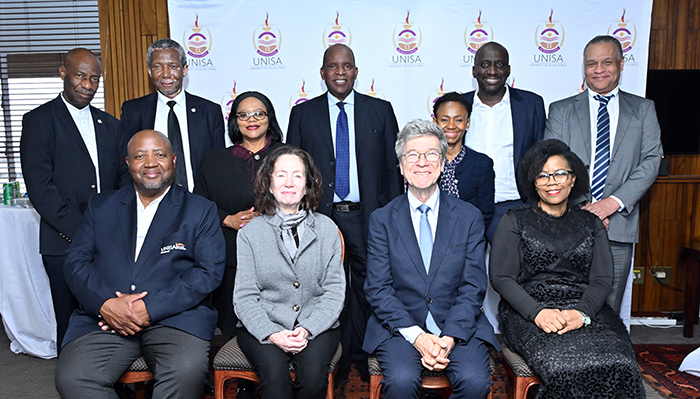
Seated, from left: Dr Dan Mosia, Dr Sonia Ehrlich Sachs (Prof Sach's wife), Prof Jeffrey D. Sachs and Prof Puleng Lenkabula, with prominent Unisa management
Unisa presented its prestigious Founders’ Lecture on Thursday 20 November 2025, themed "Solidarity, social justice and reclaiming futures: The roles of universities in contested geopolitics".
A highlight on the institution’s calendar, the Founders’ Lecture is recognised as a flagship event for intellectual and scientific engagement in Africa and beyond. Over the years, eminent scholars and leaders from across the African continent and the world have graced this platform, empowering Unisa to engage with epistemic communities on critical issues, especially in higher education, at both national and global levels.
In her welcome address, Prof Puleng LenkaBula, Unisa Principal and Vice-Chancellor (VC), remarked: "This lecture is testament to the excellent and progressive work that the university has been undertaking." LenkaBula remarked that the lecture is a premium platform for the intellectual exchange of ideas and engagement between Africa and the world. She commended the commitment of the keynote speaker, Prof Jeffrey D. Sachs, to lifelong ideas, intellectual pursuit, and transformation, as well as the willingness to collaborate with other scholars, especially in tackling sustainable development matters.
The VC maintained that it is crucial for Africa and the Global South as a whole to engage critically in matters of social justice and solidarity for a just, peaceful, and sustainable world order, further emphasising that Africa needs to reclaim its position in the world. She also affirmed that universities are crucial institutions that must be invested in to change the plight of society through science, research, and technology.
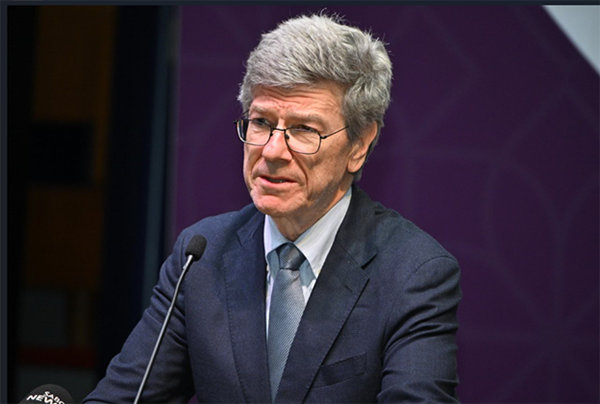
Prof Jeffrey D. Sachs
Delivering the keynote address, Sachs, a world-renowned economist and global leader in sustainable development, emphasised that solidarity, particularly African unity, is crucial for addressing the world's challenges. At the same time, social justice remains at the core of the agenda. "Reclaiming the future is an important concept, and in doing that and creating the future, we must understand the past; what was taken, and what must be reclaimed," said Sachs. Reflecting on China’s continually growing economy, its eradication of poverty, and its industrial power, he encouraged Africa to follow suit to achieve a better life for all.
Sachs contended that the United States’ imperial age is ending, just as others did. He added that the BRICS countries, comprising Brazil, Russia, India, China, and South Africa, as well as other recent partners, have 46% of the world’s population and account for 41% of the world’s gross domestic expenditure. "Therefore," he said, "this is the new phase of geopolitics."
Reflecting on the Israel-Gaza war, Sachs lauded South Africa for its bravery in standing up for justice by pursuing legal action against Israel at the International Court of Justice, citing genocidal acts against Palestinians. He condemned imperialism, explaining that “the greatest crime of imperialism is the denial of knowledge and education to the people”. He continued: “Imperialism is the worst kind of criminality, aimed at destroying, violating and disempowering the people. The most basic empowerment of the people, individually and as society, is through knowledge in order to achieve economic development.”
Continuing, Sachs stated that universities are the most fundamental institutions of societal transformation. “The future that we want is one of sustainable development, which centres on prosperity, social justice, environmental sustainability, peace, and cooperation,” he said.
Sachs urged universities to democratise quality education for young people and to train them effectively to achieve transformation, further enhancing universal access to basic services such as healthcare. He further encouraged Africa to uphold solidarity through genuine unity, which Unisa endeavours to contribute meaningfully to.
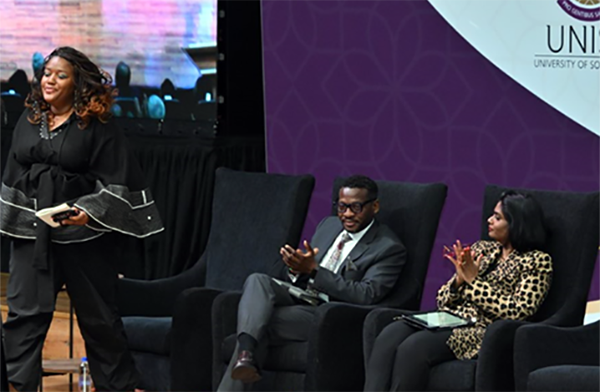
Panellists, from left: Dr Nombulelo Shange, Professor Tshepo Madlingozi and Dr Genevieve James
During a thought-provoking response session, Dr Nombulelo Shange, Sociology Lecturer at the University of the Free State, highlighted that, especially in South Africa, acts such as xenophobia have gradually led society to re-adopt colonial ideas that seek to divide Africans. Shange encouraged Africans to reclaim the true essence of Ubuntu, emphasising that sustainable development should be inclusive for them without accepting the dictates of the predominantly Western perspective.
Professor Tshepo Madlingozi, Commissioner of the South African Human Rights Commission, noted that the lack of access to equitable education remains a challenge due to poor infrastructure, overcrowding, security concerns, and a shortage of teachers. Emphasising the urgency to achieve social justice, he said: "Social injustice is a symptom of inequality, but the root cause of it is the unfinished business of deimperialism and decolonisation".
Dr Genevieve James, Unisa’s Deputy Director of Community Engagement and Outreach, noted that global reality is sparked by deep divisions, greed, corruption, spiralling violence and mounting inequalities, which hinder genuine cooperation and solidarity. James asserted that to achieve solidarity, competing interests and narrow self-gain must be countered to further enhance collective welfare.
Sachs was presented with the Unisa Chancellor’s Calabash Outstanding Educator Award by Unisa’s Chairperson of Council, Dr Dan Mosia. The award recognises excellence and the contributions of distinguished experts in shaping futures in the service of humanity. Sachs’s scholarship, leadership, and service were lauded as exemplifying the highest ideals of humanity.
In closing, Prof Solomon Magano, Unisa’s Vice-Principal of Institutional Development, expressed his appreciation for the enriching, thought-provoking and informative lecture. Magano encouraged Africa to continue working towards a more just and inclusive world.
* By Nancy Legodi, Acting Senior Journalist, Department of Institutional Advancement
** Photography by Shooheima Champion, Unisa Multimedia Centre
Publish date: 2025-11-21 00:00:00.0
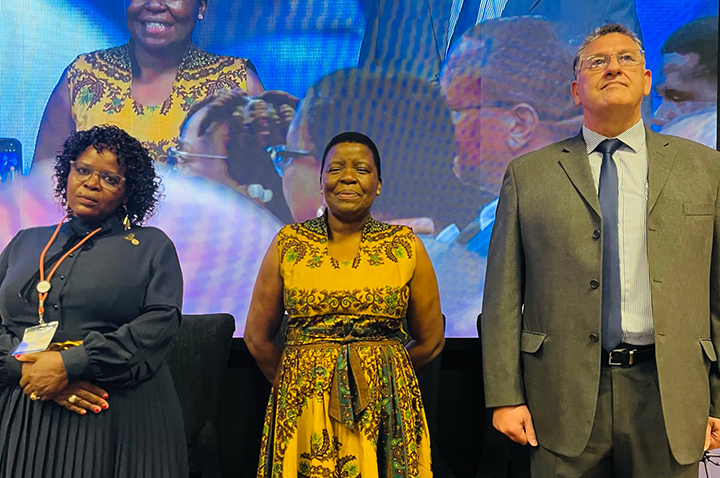 Imbizo targets fraud and corruption on a national scale
Imbizo targets fraud and corruption on a national scale
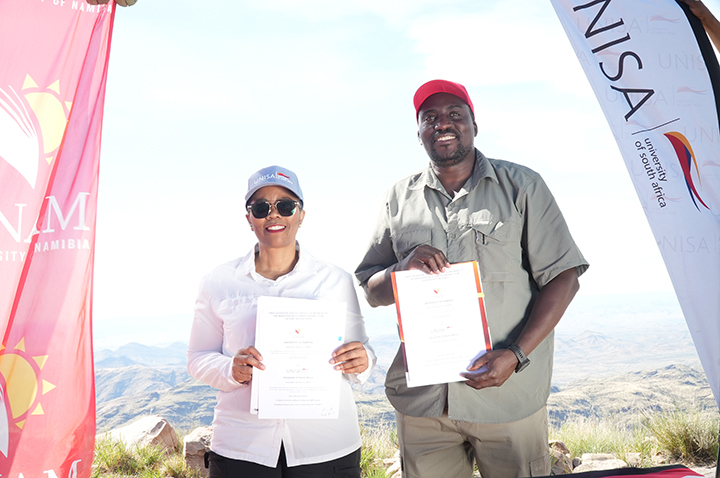 Unisa and UNAM partnership advances Africa Millimetre Telescope project
Unisa and UNAM partnership advances Africa Millimetre Telescope project
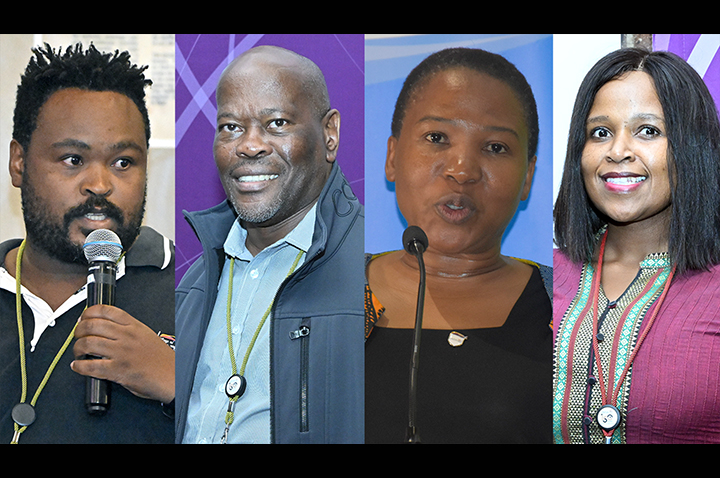 Unisans reflect on the 2026 Principal and Vice-Chancellor's Lekgotla
Unisans reflect on the 2026 Principal and Vice-Chancellor's Lekgotla
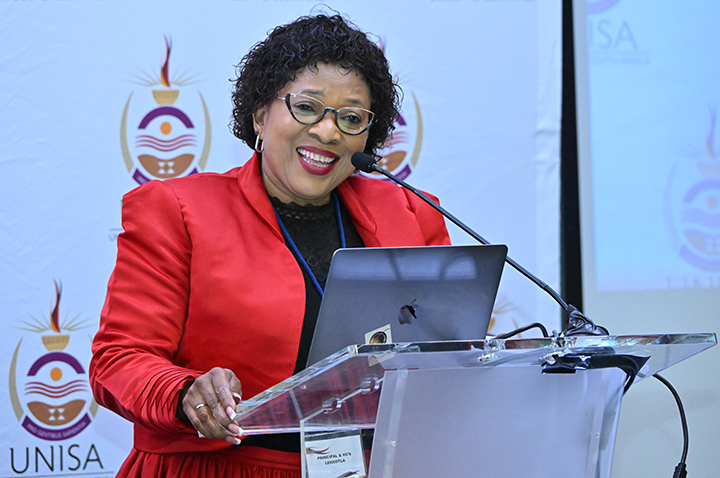 Lekgotla panel discussion rethinks the modern university
Lekgotla panel discussion rethinks the modern university
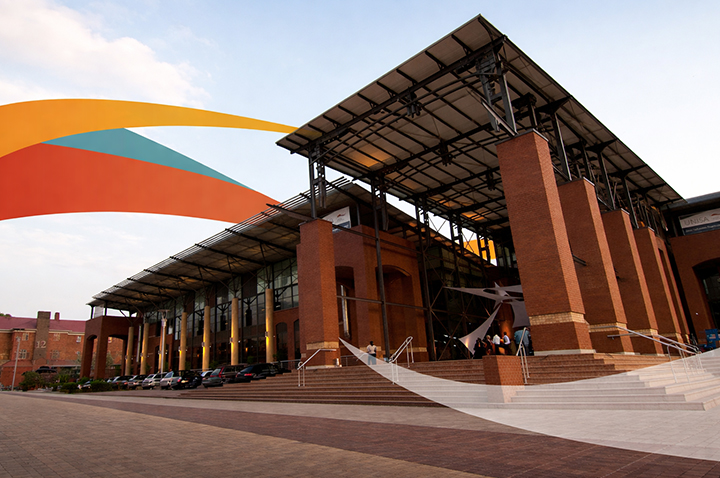 Unisa redefines student support through Inhlanyelo Hub NPC
Unisa redefines student support through Inhlanyelo Hub NPC